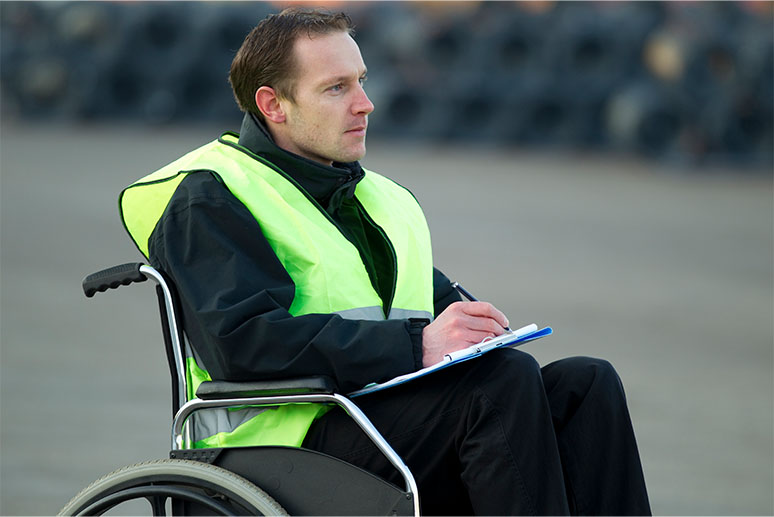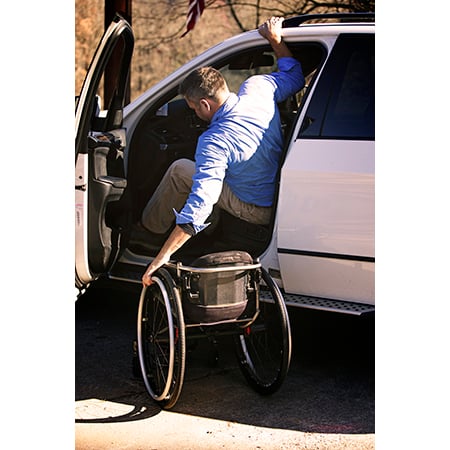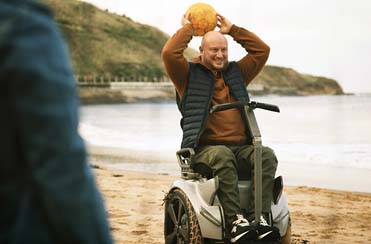If you’re returning to work after a spinal cord injury or considering new employment after an SCI to further your career, you’ve probably already discovered that looking for jobs with a spinal cord injury can turn out to be far more complicated than it should be. You may even feel that you’re restricted to a narrow range of suitable spinal cord injury jobs or careers, and this can prove to be a challenge when searching for suitable employment.

In reality, you are a premium candidate with much more to offer than many non-disabled candidates. You shouldn’t feel as though you’re restricted to specific spinal cord injury-suitable jobs; you have as much to offer as any other candidate applying for a role.
Leonard Cheshire published some research which found that 24% of UK employers said they would be less likely to hire someone with a disability. Of those, 60% were concerned that a disabled person wouldn’t be able to do the job. This demonstrates how unenlightened some employers are.
When I say ‘unenlightened’, I actually mean ‘wrong’.
Keep reading to find out why finding a new job or career with a spinal cord injury shouldn’t be a difficult challenge and why you’re an ideal candidate.
Why your SCI makes you a prime candidate for jobs
Far from being a ‘problem’ or ‘charity’ candidate, you’re a premium candidate that they would be lucky to have.
I’m not just talking about the much talked about skills shortages. By ignoring disabled candidates, they are missing out on a vast pool of talent; I’m talking about the other positive talents you have to offer to employees.
You have the same diverse range of skills as the rest of the population. And then you have a spinal cord injury. You suddenly have to learn many new skills to get through the day.
You have to develop immense patience and resilience because sometimes progress can be so slow. You can’t do some things the way you used to, so you develop incredible creative thinking skills to work out different ways of doing things.
You face unfamiliar problems to solve, so you develop strong problem-solving skills. Taking a trip somewhere has to be planned like a military operation, with contingency plans B, C and D just in case the lift is out of order or the accessible parking spaces are all full.
This means you have developed significant project management skills. All of those other qualities are necessary for you to manage your life. And they are also highly desirable to employers.
Who wouldn’t want employees who are resilient, creative, and excellent at problem-solving and project management?
Looking for a job or new career with a spinal cord injury
The first and most crucial step in finding a new job with a spinal injury is to recognise that you are a premium candidate. Not easy, I know, when society insists on treating us like second class citizens.
The second step is to make sure that prospective employers understand that people with spinal cord injuries are premium candidates.
Don’t apologetically apply for jobs, hoping someone will be kind enough to give you a chance to prove your worth. Go in confidently, knowing that not only do you have all the skills and qualities they are looking for (you wouldn’t be applying if you didn’t), but you also bring a whole load of additional qualities that they will benefit from.
A third step is to find those employers who are more enlightened and focus your efforts on them when you are looking for work. There are employers who advertise on specialist job boards (like Evenbreak or in disability magazines (like PosAbility). They wouldn’t advertise in those places if they weren’t keen to employ you.
When you find them, you can make it easier for them to hire you by asking for any adjustments in the workplace you might need and letting them know about the support Access to Work can provide.
In summary:
- Recognise that your life experience with a spinal cord injury means you bring additional, valuable qualities, making you a premium candidate in a climate of skills shortages.
- Make sure the companies you apply to also understand that you are a premium candidate – this is about talent, not pity.
- Find employers who are enlightened enough to recognise the value of employing people with lived experience of disability.
The 24% of employers who said they were less likely to hire a disabled person are the ones who deserve our pity. They are missing out on so much talent. With increasing skills shortages and a growing understanding by employers of the value of a diverse workforce, they will soon be left behind.
Do you have further questions? Get your SCI questions answered by the Navigator Team by sending us a message or contacting us on 0800 373 858.
Author Bio
Jane Hatton is a disabled social entrepreneur. She founded Evenbreak, a social enterprise run by and for disabled people. It has a disability job board where employers who want to attract disabled candidates advertise their vacancies and a career support service offering career advice and guidance to disabled people looking for new or better work.









